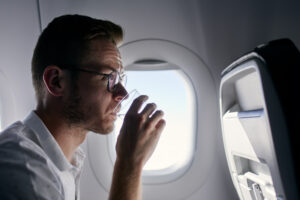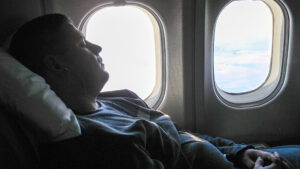Flying High: Tips for Staying Healthy in the Air
Flying High: Tips for Staying Healthy in the Air
Flying can be an exhilarating experience, whether you’re jetting off on a well-deserved vacation or heading to an important business meeting. However, spending extended periods in the air can take a toll on your body if you’re not careful. From cramped seats to recycled air, there are several factors that can affect your health while flying. But fear not! With a bit of preparation and some simple strategies, you can ensure that your next flight is a breeze for both body and mind.
1.Stay Hydrated
One of the most important things you can do while flying is to stay hydrated. The air inside the cabin is often dry, which can lead to dehydration. Make sure to drink plenty of water before, during, and after your flight. Avoid excessive caffeine and alcohol, as they can contribute to dehydration. Consider bringing a reusable water bottle with you and fill it up after passing through security to ensure you have access to water throughout the flight.
2. Move Around
Sitting for long periods can lead to stiffness and discomfort, not to mention the increased risk of blood clots. To counteract this, make an effort to move around the cabin regularly. Take short walks up and down the aisle, stretch your legs while seated, and perform simple exercises like ankle circles and shoulder rolls. If you’re on a long-haul flight, consider doing some light exercises in your seat to keep your blood flowing.
3. Pack Healthy Snacks
Airline food is notorious for being high in salt, sugar, and preservatives. To avoid feeling sluggish and bloated during your flight, pack some healthy snacks to munch on instead. Opt for items like nuts, fresh fruit, granola bars, and cut-up veggies. Not only will these snacks help keep hunger at bay, but they’ll also provide you with essential nutrients to keep your energy levels up.
4. Protect Your Skin
The high altitude and dry air in the cabin can wreak havoc on your skin. Combat dryness by moisturizing before and during your flight. Consider using a hydrating facial mist to refresh your skin throughout the journey. Don’t forget to apply sunscreen if you’re seated near a window, as UV rays can penetrate the aircraft’s windows and cause sun damage.
5. Get Some Rest
It can be challenging to get quality sleep while flying, especially on long-haul flights. However, getting enough rest is crucial for staying healthy and feeling refreshed upon arrival. To help you sleep better, pack a travel pillow, noise-canceling headphones, and an eye mask. Try to create a comfortable sleeping environment by adjusting your seat position and using blankets and pillows provided by the airline.
6. Practice Good Hygiene
Airports and airplanes are breeding grounds for germs, so it’s essential to practice good hygiene while traveling. Wash your hands frequently with soap and water, or use hand sanitizer if washing facilities aren’t available. Avoid touching your face to minimize the risk of transferring germs from your hands to your eyes, nose, or mouth. Consider bringing disinfectant wipes to clean your tray table, armrests, and other frequently touched surfaces.
7.Manage Jet Lag
Jet lag can wreak havoc on your internal clock and leave you feeling fatigued and disoriented. To minimize its effects, try to adjust to your destination’s time zone as soon as possible. Stay hydrated, get some sunlight upon arrival, and try to stick to a regular sleep schedule. Consider using natural remedies like melatonin or herbal teas to help regulate your sleep patterns.
While flying can present its challenges, staying healthy in the air is entirely achievable with a bit of planning and mindfulness. By following these tips, you can ensure that your next flight is not only comfortable but also contributes to your overall well-being. So buckle up, relax, and enjoy the journey to your destination knowing that you’re taking care of yourself every step of the way. Safe travels

















